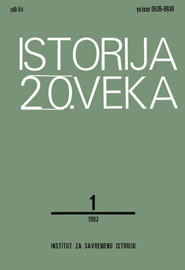BRITANSKI ISTORIČARI I MAKEDONSKO PITANJE (1914 - 1915)
THE BRITISH HISTORIANS AND THE QUESTION OF MACEDONIA 1914 - 1915
Author(s): Ubavka Ostojić-FejićSubject(s): Geography, Regional studies, Political history, Social history, Recent History (1900 till today), Pre-WW I & WW I (1900 -1919)
Published by: Institut za savremenu istoriju, Beograd
Keywords: Macedonian question; British historians; 1914-1915; British foreign policy; WWI;
Summary/Abstract: The article deals with the attitude of several British historians towards the question of Macedonia, during 1914 and 1915. At the beginning of World War I, nationality and right to self determination were proclaimed as leading political principles, by the Entente. In 1914 and 1915, however, the foreign policy of Great Britain had still no definite opinion about the future of South-Eastern Europe. Some of its most important representatives still considered Austria -Hungary as a main guarantee of status-quo in Europe, and did not approve its desintegration. But there were also quite different views, i. e. that the falling apart of Austria-Hungary, and the formation of national States in South-Eastern Europe, must follow the victory in the war. The champions of this idea, in Great Britain were several British intellectuals, mainly historians, among others: Henry Wickham Steed, Robert William Seton-Watson, Sir Arthur Evans, Sir Charles William Chadwick Oman, George Macaulay Trevelyan, Harold William Vazeille Temperley and Ronald Burrows. Their activity was specially noticeable in 1914 and 1915, when British foreign policy tried to win over neutral Bulgaria to the side of the Entente. As concerning Bulgarian demands of some important parts of Serbian national territory in Macedonia, as compensation for their joining the Entente, they were not unanimous: some of them were not particularly interested by that question, but still considered that Macedonia must be a part of the future Southern Slav State, but the others adopted the bugarophil opinion that the inhabitants of Macedonia were of Bulgarian origin. But, when Bulgaria joined the Central Powers in autumn 1915, they became champions of Serbian rights over Macedonia, criticizing the official British policy, which, according to them caused the tragedy of Serbia in 1915.
Journal: Istorija 20. veka
- Issue Year: 1983
- Issue No: 1
- Page Range: 117-126
- Page Count: 10
- Language: Serbian

